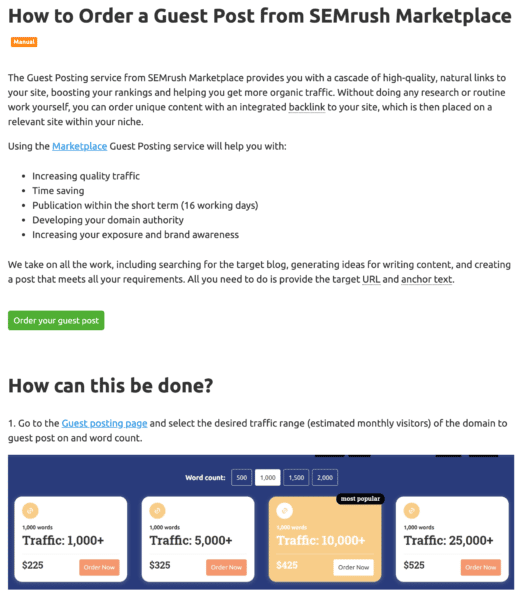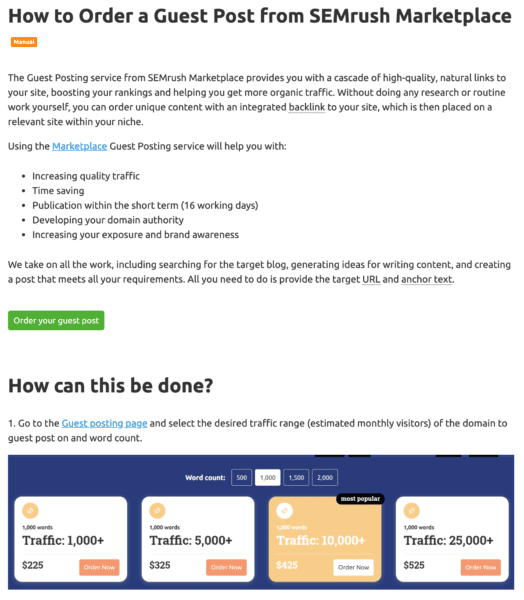SEMrush, a very popular SEO toolset, came under scrutiny in the SEO industry this week when its content marketplace added guest blogging services that highlighted natural links as a benefit to the service. This ultimately resulted in SEMrush dropping the service from its website.
SEMRush guest blogging. SEMRush removed the guest blogging page from its site, which previously said: “The Guest Posting service from SEMrush Marketplace provides you with a cascade of high-quality, natural links to your site, boosting your rankings and helping you get more organic traffic. Without doing any research or routine work yourself, you can order unique content with an integrated backlink to your site, which is then placed on a relevant site within your niche.”
Here is a screen shot of that page before it was removed by Thursday morning:

Against Google’s guidelines. John Mueller of Google responded to questions around this specific service from SEMRush on Wednesday. He said on Twitter, “That’s an unnatural link — the kind the webspam team might take action on.”
Mueller linked to a 2017 blog post from Google named “A reminder about links in large-scale article campaigns.” That post specifically mentions guest posts.
That’s an unnatural link – the kind the webspam team might take action on. https://t.co/kfQQithCnK & https://t.co/q5GmAxx2YM have more. Making sure the links use rel=nofollow / rel=sponsored would still allow sites to get visibility without having to worry about manual actions.
— 🍌 John 🍌 (@JohnMu) June 3, 2020
Google said, “Guest blogging is done” in 2014 after numerous warnings to SEOs and site owners about using guest posts as a link building tactic.
In fact, Google penalized many networks over the years, including MyBlogGuest in 2014. (We recently interviewed MyBlogGuest’s creator Ann Smarty about that experience.)
SEMRush discontinues the service. SEMRush has removed the ability to purchase guest blog placements this morning and says it does not pay for placed articles and is not selling links in a pop-up notice on the site: “We are pausing the test of our guest blog post editorial/placement service, which will require more time to implement given the volume of orders received and our commitment to excellence. The service is about content development and editorial coordination. We do not pay publishers for placed articles and not selling links.”
This message sounds just like what others who tried to sell guest blogging have said after Google said it was against its guidelines.
Will SEMRush be penalized? That is hard to know. Mueller responded that it is against Google’s guidelines, but said he often does not report things like this to the webspam team. The spam team probably can find out about this themselves at this point.
Check your manual actions. If you are using this or a similar service, make sure to login to Google Search Console and check for any manual actions. Google normally will notify if you these manual actions via email but it is worth double checking manually every week or so.
If you did receive a manual action, then you will need to submit a reconsideration request after removing the guest posts or adding nofollow link attributes to the links.
If you did use these services, it would be wise to add nofollow link attributes to those links now, just in case Google does issue penalties.
Why we care. It is a bit surprising that SEMRush, a seasoned SEO toolset company, would offer a service like this given the history Google penalties have with guest blogging. It appears SEMRush has taken the proper step of removing the service and reconsidering it all together.
SEMRush’s content marketplace is about a year old, and the guest blogging portion of it has been available for even less time. This likely won’t impact the company and its popular toolset in a meaningful way. Hopefully no one who used the service receives a Google penalty, but be sure to do some housekeeping on your end if you’ve used this or similar link selling services.
The post SEMRush drops paid guest blogging service after Google policy scrutiny appeared first on Search Engine Land.
Source: IAB

